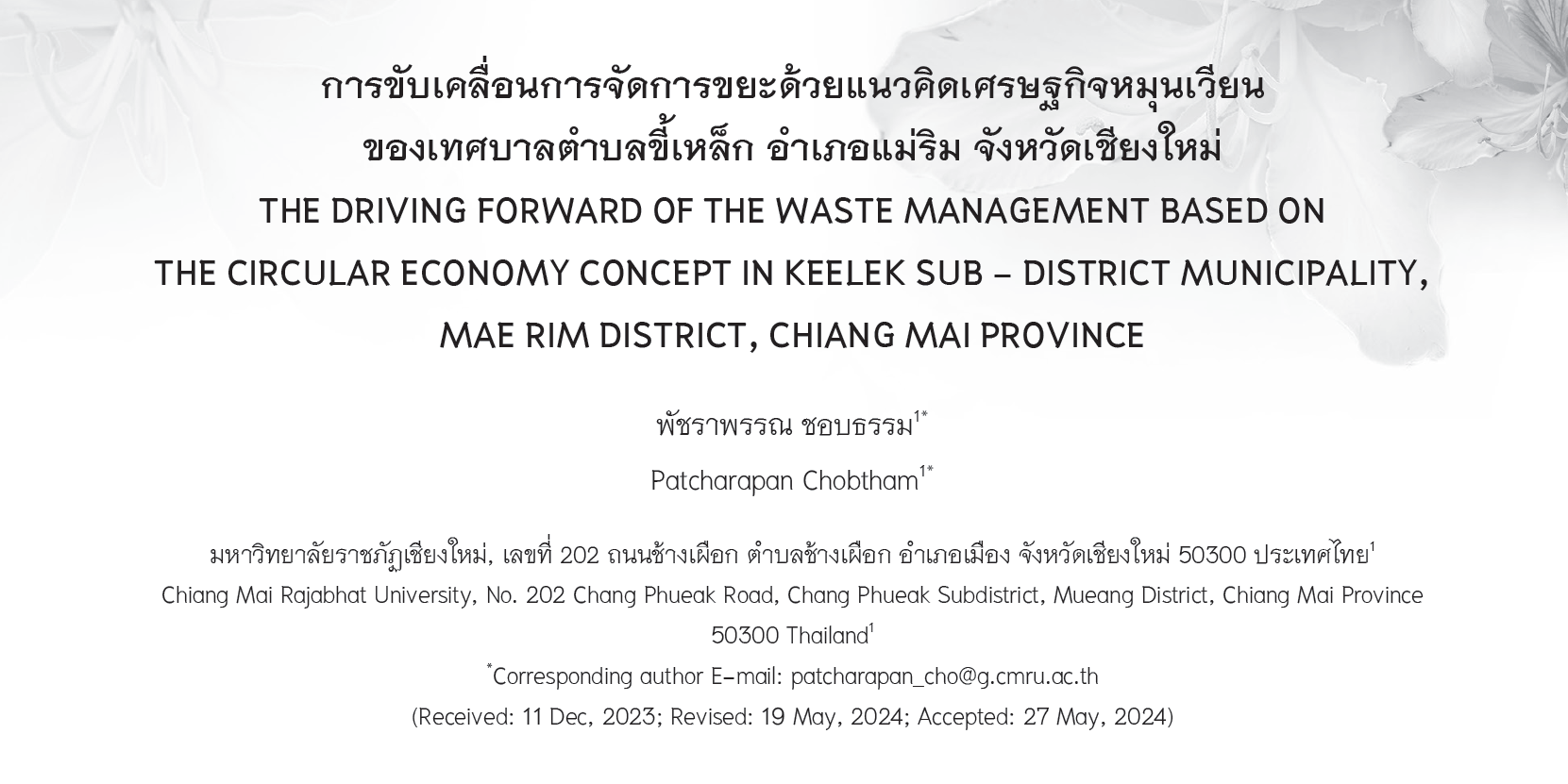The Driving Forward of the Waste Management Based on the Circular Economy Concept in Keelek Sub - District Municipality, Mae Rim District, Chiang Mai Province
Main Article Content
Abstract
The research’ s objectives were for studying the driving forward of the waste management based on the circular economy concept and analyzing factors affecting success and failure of the waste management in Keelek Sub - District Municipality, Mae Rim District, Chiang Mai Province. This research was conducted by qualitative method which encompassed the data and documents as well as the In-depth interview with 13 persons, namely personnel in Keelek Sub - District Municipality and leader community representatives in village number 1 - 8, Keelek Sub - District. The content analysis and descriptive analysis were also implemented in this research. The results of this research showed that Keelek Sub - District Municipality had propelled the waste management according to laws, development directions, waste increasing issue in community and village community. The mayor of Keelek Sub - District therefore imposed policy, strategic management on natural resource and environment. The mayor then assigned Public Health Division and Agriculture Division under the Keelek Sub - District Municipality to conduct project focusing on solving waste issue at its origin and create value from waste project according to the principle of 3Rs: reduce, reuse and recycle. It initiated the project initiated the project of waste separation from its origin, promoting making bio - fertilizer activity, value - added recycle waste project. The projects and activities had collaborated with community and other organizations; academic institutes and private sectors. Finally, the key success factor in the driving forward of the waste management based on the circular economy concept was the local administration’s policies. On the other hand, the failures were insufficient budget for operation, lack of community participation, lack of continuation and building on the concept as well as less of community’s awareness.
Downloads
Article Details

This work is licensed under a Creative Commons Attribution-NonCommercial-NoDerivatives 4.0 International License.
The articles published are copyrighted by the Graduate School, Chiang Mai Rajabhat University.
The opinions expressed in each article of this academic journal are solely those of the individual authors and do not reflect the views of Chiang Mai Rajabhat University or its faculty members. The responsibility for the content of each article rests entirely with the respective authors. In the event of any errors, the authors alone are responsible for their own articles.
References
Apipalakuldumrong, W. (2022). Development of solid wastes management system of local administration organization of Patumthani Province by circular economy. (Dissertation of Doctor of Philosophy, Social Development, MahachulalongKornrajavidyalaya University). [In Thai]
Aunroj, P. (2021). Good practices in participatory waste management of Wiang Thoeng Subdistrict Municipality, Thoeng District, Chiang Rai Province - turning a crisis into an opportunity. Environment Journal, 1(25), 1 – 9. [In Thai]
Bacarrini, D. (1999). The logical framework method for defining project success. Project Management Journal, 4(30), 25 – 32.
Ellen Macarthur Foundation. (n.d.). Circular economy introduction. Retrieved from https://ellenmacarthurfoundation.org/topics/circular-economy-introduction/overview
Keelek Subdistrict Municipality. (2019). Local development plan (2018 – 2022). Retrieved from http://keeleklocal.go.th/public/plan_upload/backend/plan_12_5.pdf [In Thai}
Keelek Subdistrict Municipality. (2021). Activities. Retrieved from http://keeleklocal.go.th/public/activity/data/detail/activity_id/206/menu/141 [In Thai]
Ministry of Higher Education, Science, Research and Innovation. (2021). Mobility action plan Thailand development with the BCG economic model 2021-2027. Retrieved from https://www.bcg.in.th/bcg-action-plan/ [In Thai]
Nimpanich, J. (2011). Policy implementation: political science public administration perspectives and Thai case studies. Bangkok: Chulalongkorn University Press. [In Thai]
Pollution Control Department. (2011). Guideline of waste management and waste – to - energy technologies for municipalities. Retrieved from https://www.pcd.go.th/publication/5005 [In Thai]
Pollution Control Department. (2021). The Thailand state of pollution report 2020. Retrieved from https://www.pcd.go.th/pcd_news/11873 [In Thai]
Promsaka Na Sakolnakorn, T. (2019). The guideline for promotion of circular economy program of local administrative organization for sustainable community development. (A Thesis the Degree of Master of Arts in Human and Social Development Inter, Department of Human and Social Development, Chulalongkorn University). [In Thai]
SCG Circular Way. (2019). Circular economy - new business opportunities for sustainability. Retrieved from https://www.scg.com/sustainability/circular-economy/interesting/circular-economy-is-new-chance/ [In Thai]
Thailand Institute of Scientific and Technological Research. (2019). Circular economy that everyone should know. Pathum Thani: Thailand Institute of Scientific and Technological Research. [In Thai]
The Health Promotion Foundation. (2020). Report on study results for development guidelines for driving sustainable management of solid waste from communities at source in the Mueang District area Khon Kaen Province. Retrieved from https://resourcecenter.thaihealth.or.th/index.php/article/แก้ปัญหาขยะอย่างยั่งยืนเริ่มที่ต้นทาง-ภารกิจท้าทายของเทศบาลนครขอนแก่น [In Thai]
The Office of Industrial Economics. (2020). Guidelines for the development of Thai industries according to the circular economy concept. Retrieved from https://www.oie.go.th/assets/portals/1/files/study_report/DevelopThaiIndustries_CircularEconomy.pdf [In Thai}
World Economic Forum. (2014). Towards the circular economy: Accelerating the scale – up across global supply chains. Geneva: World Economic Forum.


